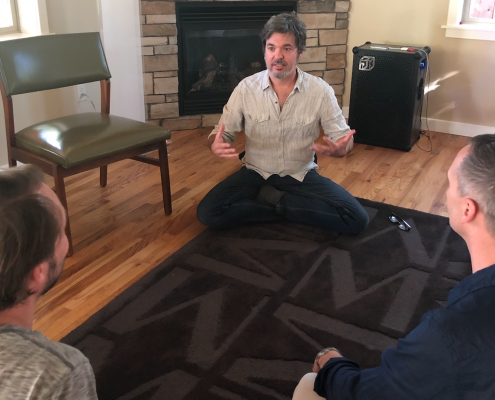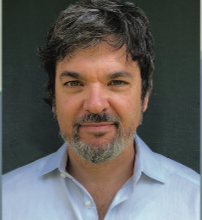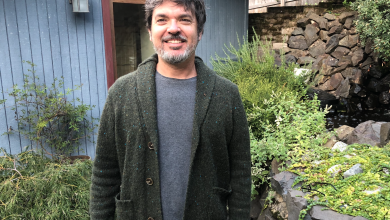Slade Machamer Essence Lab From Knowing Yourself to Being Yourself
Hello Slade, and welcome to LocalsGuide. Thanks for taking the time to do this interview with us today.
Thanks, it’s great to speak with you. I’ve enjoyed writing columns for The LocalsGuide from the Essence Lab perspective. I’m excited to dive deeper into how we work.
Great, I am excited to explore this topic with you. To begin with, can you jump right in and explain the difference between knowing and being yourself?
Great question. We differentiate between these two ideas based on our experience with people and our own journey. Many of those attracted to Essence Lab have worked on themselves and their relationships. They’ve attended workshops, read books, listened to podcasts, can articulate their issues and usually trace them back to family of origin. They come to Essence Lab because with all of their insight or ‘knowing’, they can’t shift their patterns in relationships.
Simply put, ‘knowing yourself’ is critical but it doesn’t mean you’re free from your patterns and conditioning. Your head gets it but it doesn’t mean your heart is free. When you’re ‘being yourself’, you’re free to respond from your innate wisdom and have more access to what you feel in the moment. We believe you already have this wisdom as an expression of your Essential Self and it’s our passion to help you come from that place.
Please describe the Essential Self?
You are by nature already whole. The Essential Self is who you are at your core and has all of the wisdom and compassion to create the life you want. Your Essential Self only gets obscured by the wounded parts of you and the parts trying to protect you and survive in this world.
 Slade, how are these principles practiced in a relationship and why is relationship important to this process?
Slade, how are these principles practiced in a relationship and why is relationship important to this process?
To clarify, when I speak of relationship, I’m referring to the relationship between you and yourself, you and others and you and life. Once you get into conscious relationship with something or someone you’re empowered to change it. My work with clients involves intimate relationships but isn’t limited to it. Relationship is critical in the process of becoming more of your Essential Self because it reveals the places where you’re defended or open. Triggers that arise in relationship are helpful in that they point to where you need to work. When you get to the deeper pain or emotion beneath your triggers (internal or external strong reactions), you uncover a freedom to respond from a more essential place.
Will you please tell us more about yourself, your wife Mesha, and Essence Lab.
I’m a Life and Relationship Mentor, passionate about helping my clients have more access to their Essential Self to serve their life. Whether I’m working with individuals, couples, or groups, I come from an Essence Lab perspective. Mesha and I created Essence Lab because we wanted to bring our years of experience working with clients along with our own relationship practice to people longing for a more nourishing way of being in relationship. Mesha and I both teach and train this relationship practice to couples, groups, coaches, and leaders. I facilitate and mentor individuals and groups of men in this process. For the purposes of this interview, I’m going to focus on my mentoring work.
Slade, please talk more about your approach and the philosophy behind the work that you do.
Many people I work with don’t recognize they’re triggered until something happens in life that tells they haven’t been themselves. I help them find where they disconnected and use their triggers to reconnect them with themselves and their vulnerability. My work stems from the five foundations of the Essence Lab practice.
Present Centered: Use what comes up in the present moment to find where you are stuck in past patterns.
Parts Centered: Find more Essential Self by addressing the parts who protect your vulnerable feelings. My approach to parts is based on the Internal Family Systems model.
Emotion Centered: When emotions are accessed in the present moment, they give you a direct way to connect with your essence.
Inquiry Centered: The process of radical curiosity allows you to track your current behaviors and patterns down to their emotional root where healing can occur.
Relationship Centered: All of this is worked in the practice of relating.
What are some examples of issues your clients are dealing with?
Many of my clients feel stuck in certain patterns of relationship. They’re in the same fight over and over and it feels like Groundhog Day. Some continually feel like ‘not enough,’ while others feel like their needs will never be met. Often, there’s a growing distance between them and others and they can’t figure out how to reconnect. Whether it’s with a partner, friend, colleague, son, daughter or parent, people need support in relationship with themselves, others, and life. You may ask yourself what gets in the way of being yourself, taking care of your needs, or feeling comfortable in your own skin? Any of these can be doorways into a deeper inquiry.
How do you help individuals recognize places in which they are stuck? How do they move beyond this point?
My clients are often painfully aware of where they’re stuck. For example, Bob comes home from work and his partner Lisa tells him he’s distant and impossible to connect with. This happens a lot. He gets that it’s an area of struggle and even understands why Lisa’s upset. But he can’t change the pattern or get in touch with his own emotions about it. For example, he has resentment, fear of having no space for himself, or pain he accrues during the day that he doesn’t know how to share. Bob is stuck because he isn’t in touch with the feelings or needs underneath the pattern of disconnect. My work is to help Bob identify the part of him who ‘checks-out’ and find out what emotion it’s protecting. We don’t disconnect unless there’s a good reason for it. Once Bob’s in relationship with what he’s feeling, he can relate to Lisa from a more honest place that allows them to be more connected. Although I am talking about this specific interaction, this dynamic likely shows up in all Bob’s relationships.
What are some factors you would attribute to making your work exceptionally effective?
It’s an embodied practice, not a theory. The biggest factor is that everything Mesha and I teach came from our own experience and how we live our lives. We were originally drawn together by our shared passion for emotional work and the healing potential of relationship. Each time we’ve faced our shadow or protections, we’ve worked our way back to a present-centered relationship. That set a foundation for how I work, how we treat one another and the respect and compassion that permeates the practice.
Can you share a testimonial or two that speaks to what you are sharing?
“Mesha and Slade are like two conductors guiding us towards ourselves. They pass the baton back and forth using their skills & knowledge to support each person. They have created something that I have been looking for for years; a sweet, safe & dynamic space where people can work on themselves together. Being in this space allowed me to be vulnerable with others, learn about the different parts of myself and gain valuable feedback from others in the present moment. I did not expect how much I would learn from being in relationship to another’s process. Their group work adds a whole new dimension to personal growth. I love it!” Janet W
“Slade delivers a message and tools through a sincere and insightful way, with an open and courageous heart. I feel enriched to work with him.” John B.
What are some of the doubts or concerns your clients run into when first starting to work with you?
People’s primary concern is “is this going to work?” They’ve tried various approaches to healing with varying degrees of success. Many of them left emotional work because they weren’t changing enough and tried meditation, shamanism, tantra, psychedelics, ancestor work or some devotional path. These paths can be helpful but many find that these practices alone haven’t been sufficient in unlocking more of the life or the relationships they long for. They may experience an opening after an intense workshop or spiritual experience, but the momentum of their lifelong patterns pull them out of that “opened up” state. So I encounter exhaustion in people who’ve tried so hard to shift and just want to feel some traction towards getting their needs and wants met. Often Essence Lab can help them integrate the other work they’ve been doing.
What do you do to help your clients slow down, reflect, and take responsibility for their patterns?
When their patterns emerge in session, I invite them to be present with what is happening, pause and notice the tone or words they just used. Sarcasm, resignation, blame or “he always” “she never” etc. Then the inquiry begins. We get curious about what they’re feeling underneath the tone. What part of them is speaking? What’s the real need, the deeper hurt? This process immediately helps them feel compassion for the parts of them that unconsciously cause problems in their life. From this place of compassion, they can take responsibility for their behaviors without it meaning there’s something wrong with them.
What are some of the tools you provide to your clients to help them get regulated and come back into compassion?
My primary tool is teaching people how to remain present when they become triggered and then use an inquiry process to connect with their parts and emotions. Once someone is connected more directly to themselves, rather than coming from their protective parts, they naturally begin to regulate and come back into compassion. I support this practice with guided meditation, somatic inquiry, role play, humor, and a good dose of acceptance of where you are in any given moment.
What is required for your clients to be successful?
To start, it only takes curiosity and a sense that there’s more of yourself you could be bringing to your life and relationships. In the longer term, it takes commitment to do the work and an acceptance that there aren’t quick fixes. That doesn’t mean that you don’t experience results immediately, but it does mean that the patterns that have been created over decades take time to unwind and heal. I often see new aliveness and connection in clients early into their work as they orient towards their stuck places from a more productive place. And while it may feel at times like they’ve taken two steps forward and one step back, they know that they’re on the road towards the life they want.
Slade your passion for helping others has allowed you to work across many different mediums. Please tell us more.
Because my main interest has always been in helping people find and express their authentic selves and unique gifts, especially in the midst of the shame so many of us are burdened with, I’ve found myself in many different roles. In addition to life and relationship mentoring, I run men’s groups and mens’ weekend intensives in Ashland with my friend and colleague Ryan Ginn. I’ve also worked in a variety of leadership roles in business. I recently wrapped up seven years as a VP for a large business-coaching network where I mentored and trained our coaches on how they engage clients in a more relational and meaningful way. I’m also on a consulting team called Invisible Edge© which works with large corporations teaching their leaders how to bring the power of intuition to their decision-making and innovation. I love the range of working one-on-one along with working with larger groups and most recently creating training workbooks for thousands of sales managers. It always comes back to listening to needs and bringing them into conscious relationship.
Awesome! What are the next steps for anyone wanting to learn more?
The best way to reach us is through our website www.EssenceLab.org. I’ll also be speaking at the Ashland Food Coop for free on October 21st from 6-8pm. The talk is titled “Bring More ‘You’ to Your Life and Relationships.”
Learn More:
Essence Lab
www.EssenceLab.org
541-326-2353


